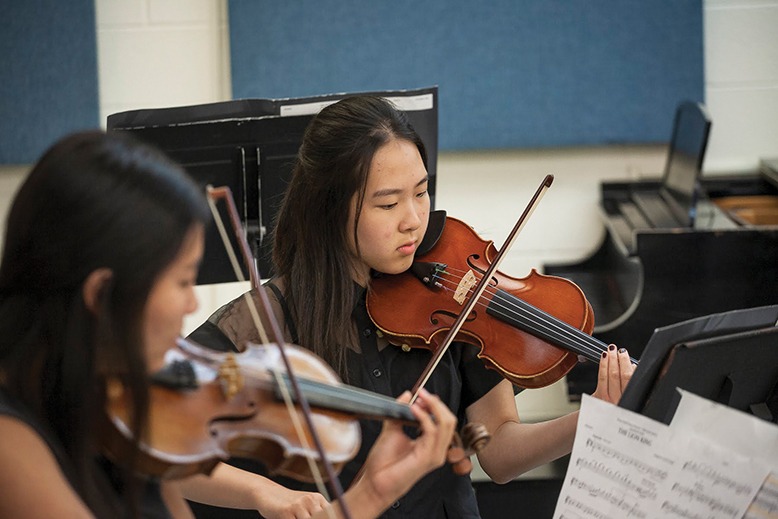
Members of the Paramus High School orchestra perform at an event celebrating arts in education. Courtesy of Arts Ed NJ
The arts have long been a staple of childhood development. Yet over the past two decades, researchers have taken a closer look at the intersection between arts education and social-emotional learning (SEL). Experts have always understood that the arts, by their nature, are social, particularly when you look at schools where students collaborate and learn the benefits of teamwork in chorus, band, dance and theater.
Indeed, what sets the arts apart from other aspects of academic education is their emotional component, explains Robert Morrison, executive director of the Warren-based Center for Arts Education and Social Emotional Learning (ArtsEdSEL).
“You cannot look at a piece of art without feeling something, even if that something is ambivalence or dislike,” says Morrison. “The same is true of music, dance and theater. So, understanding that there are emotional attributes within the arts, the question becomes: How do we intentionally use the arts to activate social-emotional learning in students?”
Arts Ed NJ—described as the unified voice for arts education in New Jersey—launched ArtsEdSEL this year to facilitate SEL-informed arts education. The goal is to activate competencies of self-awareness, self-management, social awareness, relationship skills and responsible decision-making through arts education among students and teachers from pre-K through high school.
[RELATED: Drawn to Nature: The Art of Botanical Doodling]
ArtsEdSEL is working closely with arts educators, superintendents and staff in the Garden State and nationwide on developing curriculum, experiences and resources that engage students and get them thinking and reflecting on their own. For example, instead of handing students a piece of music with no context and asking them to play the notes, this new mode of instruction encourages teachers to have the student listen to the song first, then ask them what it made them feel. After the students rehearse the piece, they are asked what they think about it and what they could do differently—rather than the instructor saying what went wrong. It is all about getting students to develop a relationship with the music.
Maurice J. Elias, a professor of psychology at Rutgers University, director of the Rutgers Social-Emotional and Character Development Lab, and an ArtsEdSEL senior advisory board member, sees this kind of thinking as an important breakthrough. “In every era, there are moments of tremendous clarity, when forces converge and something new, dynamic, and necessary emerges,” says Elias. “The arrival of the Center for Arts Education and SEL is just such a moment.”
Given the onset of Covid-19 last year, this moment could not have come soon enough. Studies have shown the pandemic has increased teenage anxiety, stress and suicidal tendencies as a result of the losses students have suffered, of people, activities or milestones being taken away, such as prom or graduation.
Morrison believes that arts education can play a critical role in bridging students back into schools, since so many of them identify with the arts. “Students can’t learn until they feel safe and find a place they belong,” says Morrison. “Until we take care of that, the other things won’t matter.”
For more information, go to ArtsEdSEL.org.



